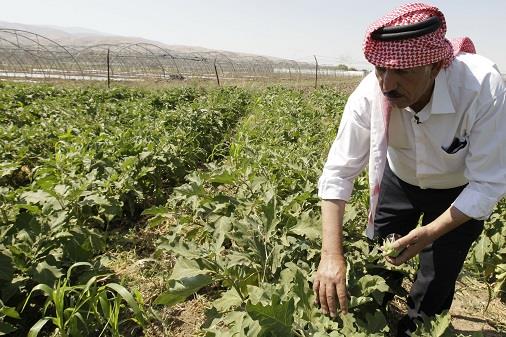FAO applauds Jordan’s agriculture transformation towards high-value crops

A Jordanian farmer tending to his crops. ©FAO/Khalil Mazraawi
25 April 2018, Jordan – FAO Assistant Director-General and Regional Representative for the Near East and North Africa (NENA) Abdessalam Ould Ahmed praised Jordan’s agriculture and water management practices and called the region to take note.
This came during the First Jordanian International Agricultural Forum and Exhibition, where Ould Ahmed delivered a statement on behalf of FAO Director General José Graziano da Silva.
Ould Ahmed stated that Jordan is amongst the four most water stressed countries in the world. The Syrian crisis, now in its eighth year, has taken its toll on the country even more, which now hosts more than 1.3 million Syrian refugees, he emphasized.
Yet, despite these exceptional constraints, Jordan remains relatively food secure because of the successful transformation of the agriculture sector in the country, which progressively adjusted its production towards high-value crops that have a lower footprint.
Today, 70 percent of harvested areas in Jordan are invested in horticultural crops such as fruits, vegetables and olive trees. This is almost twice the regional average. Horticultural crops use less water per ton, and, with the right care, are capable of generating far higher gross returns than cereals and other basic food products.
Therefore, despite the many constraints facing the region, there are equal opportunities. The rapid expansion of domestic markets for high-value added products such as horticulture, poultry, fish or dairy offers an opportunity to “diversify farming systems and develop a competitive and labour-intensive smallholder sector”.
Ould Ahmed added that FAO is proud of its partnership with the Government of Jordan and that together we are closely working to advance the sustainable development goals, in particular SDG2 for Zero Hunger.
The two-day forum will discuss working papers on food security and sustainable agriculture in light of water scarcity as well as climate change, domestic and external investment, marketing, agricultural transformation and job creation.
